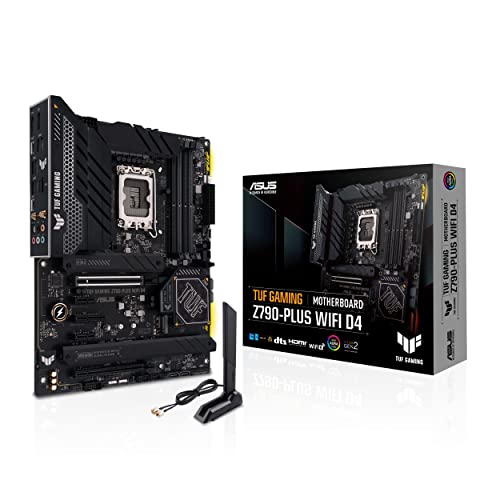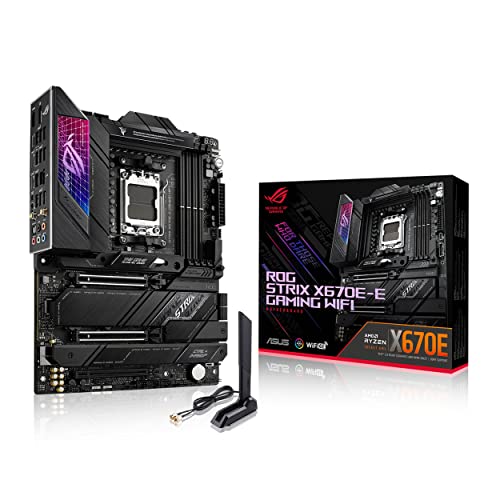1Factors to consider when choosing a motherboard
One factor to consider is build quality. A motherboard with good build quality is likely to be more reliable and last longer than one with inferior construction. Look for features such as solid capacitors, which are known for their durability and reliability, and a sturdy backplate to provide extra support and help prevent flexing.
Another important factor is BIOS features. The BIOS (Basic Input/Output System) is the software that controls the boot process and system hardware settings, and a good BIOS can make a big difference in terms of system stability and performance. Look for a motherboard with a user-friendly BIOS interface and advanced features such as fan control, system monitoring, and overclocking options.
Overclocking capabilities are also an important consideration, especially if you plan on pushing your processor to its limits. Not all motherboards are created equal in this regard, and some may be more suitable for overclocking than others. Look for features such as advanced power management, robust VRM (voltage regulator module), and support for high-speed memory.
Finally, price is always a factor to consider when choosing a motherboard. It’s important to find a balance between your budget and the features you need. Don’t be afraid to spend a little extra for a motherboard that meets your requirements and offers good value for money.
So essentially, choosing the right motherboard for your PC requires careful consideration of factors such as build quality, BIOS features, overclocking capabilities, and price. Taking the time to research and compare your options can help ensure you get the best motherboard for your needs and budget.
3FAQ
What motherboard can support i9 13900K?
We recommend the: ASUS TUF Gaming Z790-Plus
– A robust VRM (voltage regulator module) with enough power stages to support the processor’s high power requirements.
– Active cooling for the VRM to prevent overheating during heavy workloads and overclocking.
– Support for high-speed memory, such as DDR5-3200 or higher.
– Multiple M.2 slots for lightning-fast storage options.
– A comprehensive BIOS with advanced fan control, system monitoring, and overclocking options.
There are many great motherboards on the market that meet these requirements and are suitable for the i9-13900K. It’s important to do your research and compare your options to find the best one for your needs and budget.
Does Z690 support 13900K?
– Support for PCIe 4.0, providing faster data transfer speeds and improved overall system performance.
– Advanced power management and robust VRM design for improved stability and overclocking capabilities.
– Support for high-speed memory and multiple M.2 slots for lightning-fast storage options.
Overall, the Z690 chipset is a great choice for use with the i9-13900K and can provide a solid foundation for a high-performance PC build.
The downside of choosing a Z690 is that it requires a BIOS update.
Can you use DDR4 with 13900K?
The i9-13900K can support DDR4 memory with speeds of up to 3200 MHz or higher, depending on the motherboard and the specific memory modules used. It’s important to choose high-quality DDR4 memory and ensure that it is compatible with your motherboard and processor to get the most out of your system.
However, in general, using DDR5 memory can provide significant benefits in terms of performance and can help you get the most out of your processor. It’s an important consideration when building or upgrading a PC with this high-performance processor.
What’s the best motherboard for i9?
– Build quality: A motherboard with good build quality is likely to be more reliable and last longer than one with inferior construction. Look for features such as solid capacitors, which are known for their durability and reliability, and a sturdy backplate to provide extra support and help prevent flexing.
– BIOS features: The BIOS (Basic Input/Output System) is the software that controls the boot process and system hardware settings, and a good BIOS can make a big difference in terms of system stability and performance. Look for a motherboard with a user-friendly BIOS interface and advanced features such as fan control, system monitoring, and overclocking options.
– Overclocking capabilities: If you plan on pushing your processor to its limits, look for a motherboard with advanced power management, a robust VRM (voltage regulator module), and support for high-speed memory.
– Price: It’s important to find a balance between your budget and the features you need. Don’t be afraid to spend a little extra for a motherboard that meets your requirements and offers good value for money.
By considering these factors, you can find the best motherboard for your i9 processor and build a reliable, high-performance PC.
3Conclusion
Some top picks include the MSI PRO Z790-P with its impressive VRM design and active cooling, the ASUS TUF Gaming Z790-Plus with its solid build quality and wide range of features, as well as its top-of-the-line performance and comprehensive BIOS.
No matter which motherboard you choose, it’s important to do your research and compare your options to ensure you get the best one for your system. With the right motherboard, you can fully utilize the power of your processor and build a reliable, high-performance PC.



